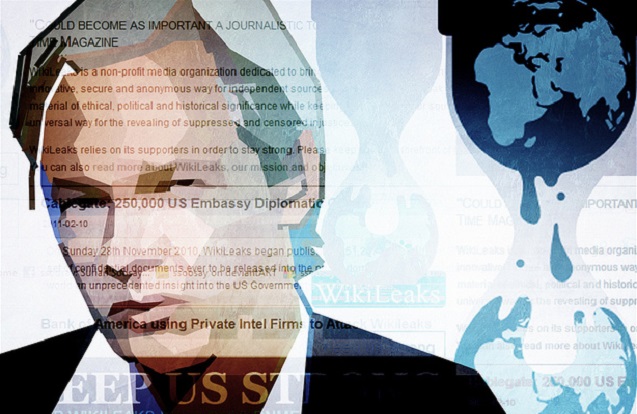
The latest Snowden revelations – including Julian Assange figuring on a manhunting timeline and a possible classification of WikiLeaks as a malicious foreign actor – clearly demonstrate the National Security State’s conflation of journalism and whistleblowing with terrorism.
If you have ever searched for “WikiLeaks” on the internet, then British Intelligence (and the NSA) probably knows who you are.
Last week, documents disclosed by whistleblower Edward Snowden and published by The Intercept reveal that the Government Communications Headquarters (GCHQ) – the British equivalent to the National Security Agency (NSA) – collected the IP addresses of people who searched for or visited WikiLeaks as part of the agency’s effort to gather information on the “human network” that supports the publisher’s site. But the documents also expose some serious potential repercussions for freedom of the press as a whole.
It all starts with WikiLeaks publisher – and my client – Julian Assange. The documents revealed last week show that the NSA designated Assange as a target on a level with members of al-Qaeda, that the agency attempted to pressure foreign allies to pursue criminal prosecution of Assange, and that the NSA considered designating WikiLeaks as a “malicious foreign actor,” which would expose anyone in contact with the site – from passive readers to volunteers, including United States citizens – to surveillance. Such tactics make it clear that Assange was right in petitioning for asylum and that Ecuador was justified in granting his request.
The NSA placed Assange on what the agency calls a “manhunting timeline.” People on these lists are targets that the NSA seeks to locate, prosecute, capture or kill, and include members of al-Qaeda. The fact that Assange, an individual who published information by whistleblowers, is on such a list shows that the NSA isn’t afraid to use its intelligence gathering authority to hinder the free flow of information.
In Assange’s case, the document released last week details how the Obama administration urged allies – including Australia, the United Kingdom, Iceland and Germany – to prosecute Assange for publishing the Afghanistan War Logs. And that was before WikiLeaks released the Iraq War Logs and the series of diplomatic cables that came to be known as Cablegate. It does not strain credulity to think that such efforts would have escalated following the series of high-profile publications that came after 2010 (when the document released last week was dated), and that the United States would have continued to abuse its power to pressure other countries into targeting Assange to stop him from publishing.
Classifying WikiLeaks as a “malicious foreign actor” would subject the website, its staff, and its readers to the widest possible surveillance and allow for spying on United States citizens who are WikiLeaks personnel – including attorneys like me.
These disclosures do more than illustrate the use of overreaching surveillance to target publishers like Assange. They also expose other news outlets, like The Guardian, The New York Times, and The Washington Post, all of which have worked with Assange to publicize documents featured on WikiLeaks. The NSA dragnet could expand to them, particularly considering the NSA has shown little hesitation to surveil United States citizens.
Also last week, the British High Court in London upheld the British government’s decision to detain David Miranda, the partner of journalist Glenn Greenwald, in Heathrow and hold him for hours of questioning under UK terrorism law, despite the fact that the trip was part of journalistic activities. Miranda was carrying documents to be delivered to The Guardian on his way back from visiting journalist Laura Poitras in Germany. The court determined that journalistic freedom was trumped by terrorism law, which opens up a dangerous door in curtailing the activities of a free press in the name of antiterrorism.
An increasingly powerful intelligence community, given such carte blanche by governments, is not good news for the fourth estate. There can be no free press under these conditions. And there can be no true democratic system without a free press.
The light that these disclosures shine on NSA activities serves only to lengthen the agency’s shadow and show us just how much we don’t know about the practices used in intelligence gathering.
We know that the NSA and the US government implemented a program to discredit and destroy WikiLeaks. We don’t know how the government plans to continue that program.
We know that British Intelligence is capable of, and has previously implemented, programs to monitor WikiLeaks readers and supporters in real time. We don’t know if those programs were ended or if they continue today.
We do know that the NSA placed Assange among the likes of terrorists on a so-called “manhunting timeline.” We don’t know if NSA general counsel ever “got back” to the agents interested in expanding surveillance of WikiLeaks to the widest possible extent by designating the site as a “malicious foreign actor.”
We do know that a grand jury was convened in Virginia to investigate WikiLeaks, and that US officials said that investigation will continue. We don’t know if Assange has been indicted (but think he may have been), forcing him to continue to live in isolation in the Ecuadorian Embassy in London.
We do know that British courts aren’t afraid to belittle freedom of the press. We don’t know how far those allowances can or will reach.
And if whistleblowers, publishers and journalists continue to be silenced, shut down and targeted, we very well might never know.
Media that fights fascism
Truthout is funded almost entirely by readers — that’s why we can speak truth to power and cut against the mainstream narrative. But independent journalists at Truthout face mounting political repression under Trump.
We rely on your support to survive McCarthyist censorship. Please make a tax-deductible one-time or monthly donation.